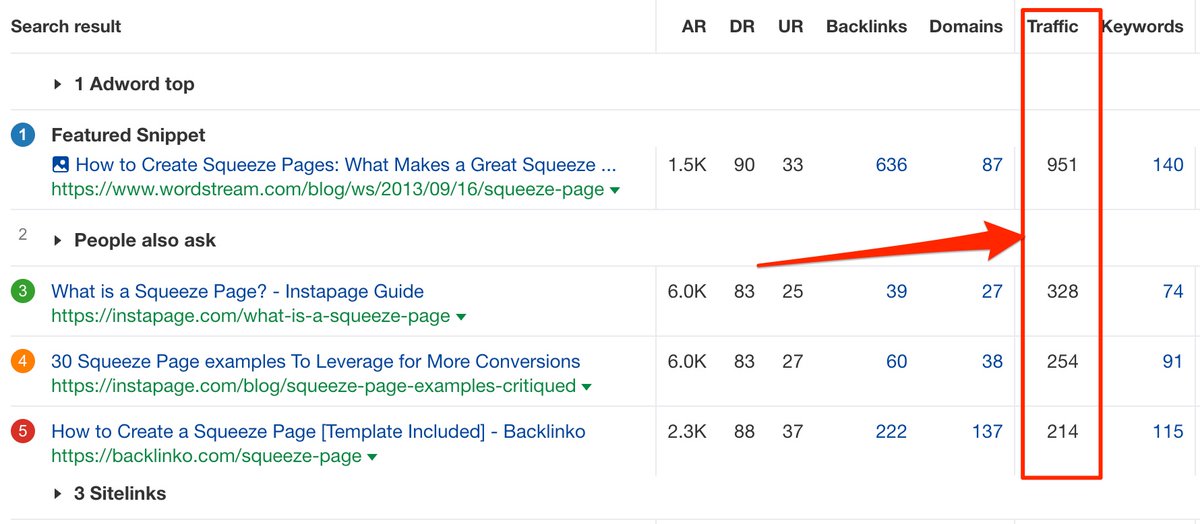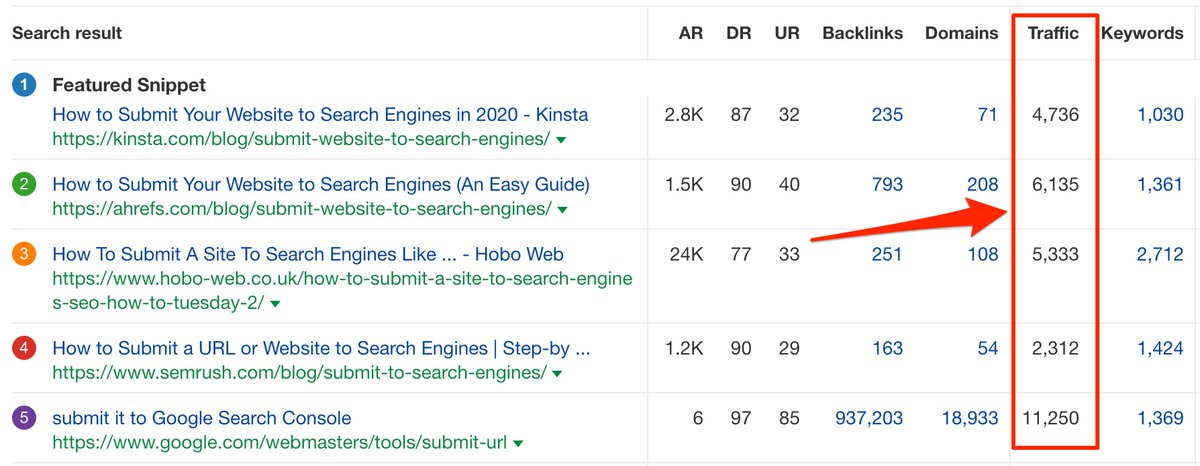
Let’s talk about “Link Building Outreach.”
I recently tried to acquire some links to one of my blog posts..
So I reviewed ~200 link prospects (collected by a contractor) and sent ~90 emails.
...and it was quite a learning experience to be honest.
[Read more..]
I recently tried to acquire some links to one of my blog posts..
So I reviewed ~200 link prospects (collected by a contractor) and sent ~90 emails.
...and it was quite a learning experience to be honest.
[Read more..]
First.. The RESULTS:
🔹 ~200 prospects reviewed;
🔹 ~90 emails sent;
🔹 13 links acquired (a few more might come later);
🔹 14 people wanted some sort of a "deal;"
🔹 3 people said "no."
15% success rate is not too shabby (from what I've heard from my SEO friends).
Soo..
🔹 ~200 prospects reviewed;
🔹 ~90 emails sent;
🔹 13 links acquired (a few more might come later);
🔹 14 people wanted some sort of a "deal;"
🔹 3 people said "no."
15% success rate is not too shabby (from what I've heard from my SEO friends).
Soo..
What did I learn in the process?
Quite a few things actually.
But before I share my "lessons" with you, please be advised that what is about to follow is mostly based on my GUT FEELING and perception, rather than any scientific evidence.
No A/B tests were done in the process.
Quite a few things actually.
But before I share my "lessons" with you, please be advised that what is about to follow is mostly based on my GUT FEELING and perception, rather than any scientific evidence.
No A/B tests were done in the process.
Lesson #1: Content quality is no panacea.
The article that I was pitching is one of my best pieces of content EVER.
It regularly picks up legit links organically and the TL;DR version that I shared on Reddit got 70+ upvotes and a silver award.
I thought this would be easy! 😎

The article that I was pitching is one of my best pieces of content EVER.
It regularly picks up legit links organically and the TL;DR version that I shared on Reddit got 70+ upvotes and a silver award.
I thought this would be easy! 😎


But as I started reaching out to people and telling them how much I worked on this piece of content and how unique, useful and notable it is...
..and why their own readers would appreciate a heads up about such a cool resource..
Folks didn't seem to care that much :(
..and why their own readers would appreciate a heads up about such a cool resource..
Folks didn't seem to care that much :(
Well..
I few people DID say that it was awesome.
But I didn't feel that all the hard work that went into that piece of content was of major help in persuading people to link to it.
I might as well have got similar results with a post which was half as good.

I few people DID say that it was awesome.
But I didn't feel that all the hard work that went into that piece of content was of major help in persuading people to link to it.
I might as well have got similar results with a post which was half as good.


Lesson #2: Ahrefs brand helped A LOT.
I got a strong impression that I was getting links because people already knew our brand and trusted that our content is awesome.
And perhaps they wanted to do us a small favour.
If I were a newbie blogger - I wouldn't have that.

I got a strong impression that I was getting links because people already knew our brand and trusted that our content is awesome.
And perhaps they wanted to do us a small favour.
If I were a newbie blogger - I wouldn't have that.


Lesson #3: People wanted an "incentive."
Many folks asked me what I could offer them in return for linking to my article.
Well..
According to Google I can't really offer them anything at all.
But if I didn't have a brand helping me to get links, that would be my only way.
Many folks asked me what I could offer them in return for linking to my article.
Well..
According to Google I can't really offer them anything at all.
But if I didn't have a brand helping me to get links, that would be my only way.

And I actually think that it is a rather healthy dynamic.
You don't reach out to people asking for 20 minutes of their time, just because you're "great" and "deserve their attention," right?
If you want someone to help you, you have to help them in return.
Duh!
You don't reach out to people asking for 20 minutes of their time, just because you're "great" and "deserve their attention," right?
If you want someone to help you, you have to help them in return.
Duh!
What about "making their content better" and "helping their readers" via mentioning your awesome article in their content?
Oh.. c'mon..
Your link will make almost exactly NO DIFFERENCE at all.
Their article is already published. Which means they're happy with it as it is.
Oh.. c'mon..
Your link will make almost exactly NO DIFFERENCE at all.
Their article is already published. Which means they're happy with it as it is.
- "But what if Google finds out about my link exchange?"
Well, according to a research study which we've carried out a while ago, reciprocal links are quite common.
73.6% of websites in our sample size of 140k DID have reciprocal links!
So an occasional link exchange is fine.
Well, according to a research study which we've carried out a while ago, reciprocal links are quite common.
73.6% of websites in our sample size of 140k DID have reciprocal links!
So an occasional link exchange is fine.

It's when all you do is trade links with shitty sites - THEN you will likely get in trouble.
Building genuine connections with people in your industry and supporting each other's work is perfectly fine.
That's how things work in real life, no?
Building genuine connections with people in your industry and supporting each other's work is perfectly fine.
That's how things work in real life, no?
Lesson #4: Outreach template doesn't matter much.
I know that many people obsess about using some magic words or psychological triggers that would make people link to them.
There's no such thing.
Ask 10 outreach "experts" to write an email and you'll get 10 different emails.
I know that many people obsess about using some magic words or psychological triggers that would make people link to them.
There's no such thing.
Ask 10 outreach "experts" to write an email and you'll get 10 different emails.
I think that most prospects are in one of 3 "states" even before you reach out to them:
1 - open to review your pitch;
2 - want a "deal;"
3 - don't care.
And the MAIN reason why people would be in "state 1" is if they've heard about you before.
Most are in state 2 or 3.
1 - open to review your pitch;
2 - want a "deal;"
3 - don't care.
And the MAIN reason why people would be in "state 1" is if they've heard about you before.
Most are in state 2 or 3.
YES!
There CAN be cases where your incredibly smart and timely outreach might melt some hearts and make people link to you, when normally they wouldn't care.
But if we're talking about sending hundreds of outreach emails - that kind of personalisation isn't scalable.
There CAN be cases where your incredibly smart and timely outreach might melt some hearts and make people link to you, when normally they wouldn't care.
But if we're talking about sending hundreds of outreach emails - that kind of personalisation isn't scalable.
Lesson #5: Follow-ups work!
A fair share of email replies that I got were from following up.
I only used one short non-intrusive follow-up though.
Did anyone if subsequent follow-ups make any difference? Plz let me know.!
PS: shout out to @PitchboxApp 💪
A fair share of email replies that I got were from following up.
I only used one short non-intrusive follow-up though.
Did anyone if subsequent follow-ups make any difference? Plz let me know.!
PS: shout out to @PitchboxApp 💪

Lesson #6: Mind the AGE of your link prospects.
How likely are you to edit an article that is 5 years old?
How about editing an article that you published last week?
See where I'm going with that?
This is how you look like asking to edit an old article:
How likely are you to edit an article that is 5 years old?
How about editing an article that you published last week?
See where I'm going with that?
This is how you look like asking to edit an old article:

And besides..
Do you think it would look natural to Google if a few dozen websites who haven't updated their articles for years suddenly decided to add a link to the same page there?
All at the same time?..
I'm pretty sure they use it as some form of a "spam signal."
Do you think it would look natural to Google if a few dozen websites who haven't updated their articles for years suddenly decided to add a link to the same page there?
All at the same time?..
I'm pretty sure they use it as some form of a "spam signal."
If you need a list of FRESH articles mentioning your topic in their content - just use @ahrefs Content Explorer.
With so much fresh content published every day, why waste your time on old articles?
(unless they rank in Google of course)
With so much fresh content published every day, why waste your time on old articles?
(unless they rank in Google of course)

OR
In @ahrefs Site Explorer you can easily see the latest links to the pages of your competitors.
Disclosure: I didn't try it this time.
And it may vary how likely is someone to link to two similar resources side-by-side.
But I can see two of my friends on that screenshot 😉
In @ahrefs Site Explorer you can easily see the latest links to the pages of your competitors.
Disclosure: I didn't try it this time.
And it may vary how likely is someone to link to two similar resources side-by-side.
But I can see two of my friends on that screenshot 😉

Lesson #7: Mind the QUALITY of your link prospects.
While doing this link outreach I caught myself ruminating on the following "outreach principle:"
"If you can't think of anything on a given website that would deserve a link, why bother about asking for a link FROM it?"
🤔
While doing this link outreach I caught myself ruminating on the following "outreach principle:"
"If you can't think of anything on a given website that would deserve a link, why bother about asking for a link FROM it?"
🤔
You might disagree with me and go after every link you can get...
But if a website looks sketchy - there's a good chance that you're looking at someone's PBN and a link from it might lead into trouble.
..plus I simply felt bad asking for a link from content that I don't like.
But if a website looks sketchy - there's a good chance that you're looking at someone's PBN and a link from it might lead into trouble.
..plus I simply felt bad asking for a link from content that I don't like.
..
So that is what I learned doing outreach for one of my best articles. 🙂
Hope my takeaways were useful.
(If so - please support this thread with a like/retweet. 🙏)
And please feel free to share your own outreach experiences in comments. I would love to learn from you too!
So that is what I learned doing outreach for one of my best articles. 🙂
Hope my takeaways were useful.
(If so - please support this thread with a like/retweet. 🙏)
And please feel free to share your own outreach experiences in comments. I would love to learn from you too!
• • •
Missing some Tweet in this thread? You can try to
force a refresh

















